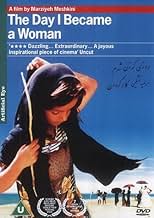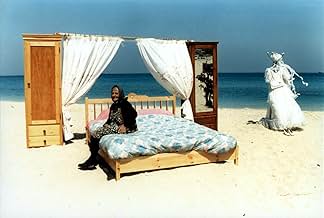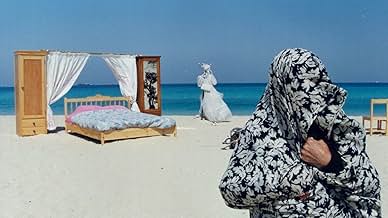IMDb RATING
7.3/10
2.1K
YOUR RATING
Three linked stories show women at life's crossroads: a girl's 9th birthday, a cycling race, and an elderly woman's dream of buying long-desired items.Three linked stories show women at life's crossroads: a girl's 9th birthday, a cycling race, and an elderly woman's dream of buying long-desired items.Three linked stories show women at life's crossroads: a girl's 9th birthday, a cycling race, and an elderly woman's dream of buying long-desired items.
- Director
- Writers
- Stars
- Awards
- 10 wins & 5 nominations total
- Director
- Writers
- All cast & crew
- Production, box office & more at IMDbPro
Featured reviews
10jakub66
Having followed Iranian cinema for a while I didn't think I was in for a surprise but Meshkini (director) managed to blow me away with the minimalist approach to depicting the fundamental issues of Iranian society. The elegance, minimalism and eloquence of this picture manage to depict the role of a woman in Iran with painful clarity.
"Roozi khe zan shodam" is an essential and defining piece of cinema.
"Roozi khe zan shodam" is an essential and defining piece of cinema.
Absolutely stunning. On the surface it's a triptych of short stories showing a girl, young wife, and old woman in Iran, but it plays as allegory, and the way it's executed by director Marzieh Meshkini is masterful. She shows great restraint and precision in everything she does, delivering a message with enough ambiguity to make the viewer ponder, and yet clearly showing the constraints of being a woman in a male-dominated society. The middle story in particular was as poetic and profound an expression of the patriarchy as I've ever seen; it was simply breathtaking. This is a film that should be far better known and seen; seek it out.
This is a beautifully shot, richly textured film. Its decidedly surrealist elements do not detract from its poignant central message: that the arbitrary social conventions which govern womens' lives in Iran are inherently absurd. What is so striking about this film is the way in which the director brings out this element of absurdity by transplanting an Iranian narrative onto the bizarre setting of Kish Island, a free trade zone and resort off the coast of Iran. The women in the film are all forced to play out the roles assigned for them by Iranian society, despite the virtual absence of the state, which is so often demonized in treatments of Iranian women's lives.
On the surface this film tells three simple stories, but its simplicity is deceiving. Each story tells an episode in the life of a woman but as the woman ages the stories become more and more surreal. In so doing Marzieh Meshkini is making a parallel with the life of Iranian women.
I saw this gem of a film a few months ago and it has lived with me ever since. There are lots of great things to talk about but I will only mention a few. I liked the striking images of the sea and the shore and the manner in which they are imbued with great meaning. The sea - which represents adventure, sensuality, fluidity, freedom and sex - is a constant motif throughout the film and is a joy to look at. I also liked the structure - reminiscent of Hemingway's short stories - where characters from one story seem to reappear in others.
But though connected through theme and also through the plot, the individual films retain a great level of distinctiveness. For instance, the second film remains unresolved at the end and the discussion of the two fellow riders in the third movie only have the effect of heightening that suspense. On the other hand, the third film has the effect of satisfactorily and unexpectedly wrapping up the first film: whereas the girl in the first film was denied the chance to enjoy the sea (and everything it represents), the old woman in the third film takes her revenge by completely inverting tradition. The image of the old woman and those motifs of domesticity being carried away on the sea is unusual but also funny. In putting not only herself but also her whole house on the sea, the old woman has inverted tradition and has the ultimate revenge.
But though connected through theme and also through the plot, the individual films retain a great level of distinctiveness. For instance, the second film remains unresolved at the end and the discussion of the two fellow riders in the third movie only have the effect of heightening that suspense. On the other hand, the third film has the effect of satisfactorily and unexpectedly wrapping up the first film: whereas the girl in the first film was denied the chance to enjoy the sea (and everything it represents), the old woman in the third film takes her revenge by completely inverting tradition. The image of the old woman and those motifs of domesticity being carried away on the sea is unusual but also funny. In putting not only herself but also her whole house on the sea, the old woman has inverted tradition and has the ultimate revenge.
Did you know
- TriviaMarzieh Makhmalbaf's directorial film debut.
- GoofsIn the first sequence, the lollipop that Hava and Hassan pass between them grows and shrinks in size without regard to the passage of time.
- Quotes
Grandmother: Will you promise to be back by noon?
Hava: I promise!
Grandmother: God won't forgive you if you lie. Don't be late.
- ConnectionsFeatured in Women Make Film: A New Road Movie Through Cinema (2018)
Details
- Release date
- Country of origin
- Official sites
- Language
- Also known as
- Dagen då jag blev en kvinna
- Filming locations
- Kish Island, Iran(location)
- Production companies
- See more company credits at IMDbPro
Box office
- Budget
- $180,000 (estimated)
- Gross US & Canada
- $149,971
- Opening weekend US & Canada
- $48,255
- Apr 8, 2001
- Gross worldwide
- $149,971
Contribute to this page
Suggest an edit or add missing content























